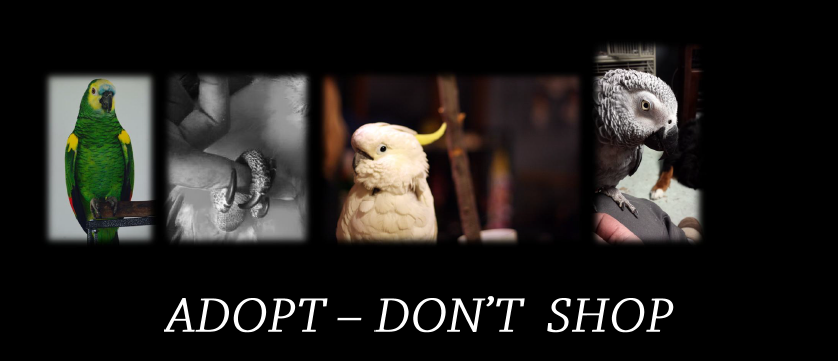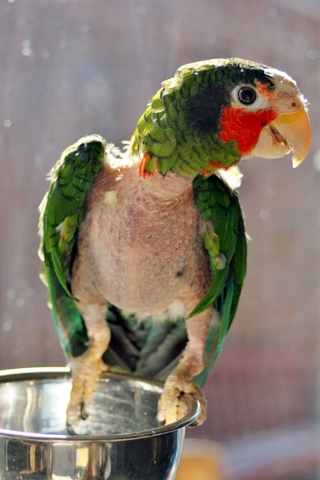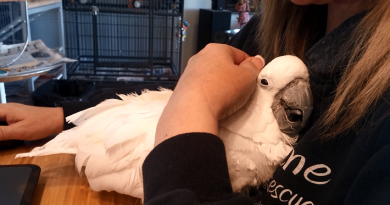Feather Plucking
Destructive Behaviors and Feather Plucking
These issues are quite common in captive parrots and are caused by a number of different reasons. With feather plucking its imperative to first rule out ANY medical issues and if a parrot has started this behavior, its important to see a qualified Avian Vet – once the vet has cleared them its time to dig into “why” this behavior has started.
Some parrots simply over preen their feathers – some start biting the ends off and some actually pull them out – some go even further by what is termed “self mutilating” chewing at their own skin causing lesions/open sores/infections and bleeding.
Finding out the reasons for plucking is very complex and not always easily corrected – this is one of the toughest behaviors that parrot owners experience – and while some are successful in treating it with environmental changes some remain chronic pluckers for life.
Feather plucking/picking/mutilating can be caused by any number of things – think of a wild parrot in their natural habitat – they get up when they want, forage all day, interact with their flock, fly for miles to find food – share in the flock dynamic – they are free – now take that same bird, place them into a cage with monitored food – no flight time, no flock and subject them to things that are not normally in their life ie:other dogs/cats/humans/sounds/smells – their freedom has been removed..being captive is a big enough stress to them already.
Physical causes:
A improperly clipped bird could easily be annoyed at the scratching from clipped feathers – when they rub against their body this could annoy them and cause them to try and remove the feather causing the irritation.
Mites/lice left undetected will cause discomfort and itching – red mites come out at night and feed on the blood of the bird and remain on them – your vet can provide testing and remedies for this.
Not enough bathing leading to increased dry skin making them itchy.
An undetected cracked/broken bone – this can cause pain and discomfort leading the bird to pick at the area.
A toy or perch or anything in the cage that they may be rubbing on that is causing unseen scratches.
Environmental causes:
Being re homed repeatedly is a major cause of stress and anxiety leading to psychological issues causing plucking.
A cage placed to close to a heating vent/window or high traffic area or to close to another bird.
A new animal coming into the home, a new baby or a caregiver leaving.
To much or to little humidity – to much or to little light.
Pollutants in the home such as cigarette smoke/drugs/air fresheners/carpet deodorizers etc.
Fear:
Some parrots come into a new home from a previously abusive situation and can have fears to either the man/woman or small children.
A dog/cat that may have hurt them previously.
A picture near their cage/article of furniture/color of a rug – these are all things that may seem normal to us but to a frightened parrot are foreign to them.
Other things need to be considered when trying to determine the causes of plucking – sometimes moving their cage or toys is distressing or moving furniture around.
Feather plucking is one of the most frustrating issues with captive parrots and many things need to be taken into consideration when this behavior starts. Once it begins, its like nail biting, a hard habit to break.
Parrots can pick up on our emotions and when confronted with a plucking bird its best NOT to react to them when you see them doing it – you could very well reinforce the behavior by giving them attention. If you run over while they are plucking, you are sending them a message that they can get their favorite person to come visit them when they pluck/play with their feathers.
Watch the bird at various times of the day and look around to see what “they” are seeing – watch for any signs of distress in the bird – nervous pacing, ruffled feathers etc observe what is going in the room when they “do” pluck and remove anything that appears to be a catalyst in their behavior.
Past issues and traumas are hard to deal with and helping the bird overcome these could take a lifetime, some birds do stop plucking with changes in diet/environment and enrichment toys – but some do not and remain chronic pluckers – if the bird starts to self mutilate you need to see an Avian Vet asap – this could easily lead to more serious issues and needs to be addressed.
Having a plucked or bald bird does NOT make you a bad owner and you should not immediately think that rehoming the parrot will change their behavior – in fact this can make it much worse.
Provide your bird with an adequate sized cage, plenty of perches and toys, a good high quality and varied diet – plenty of outside time and enrichment activities.




